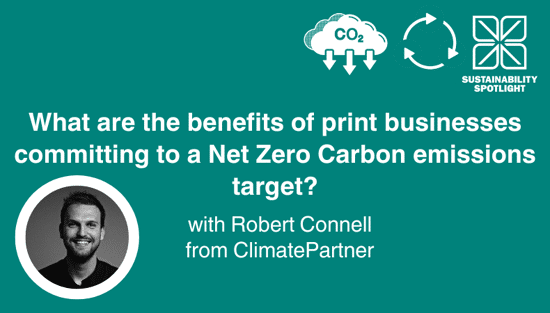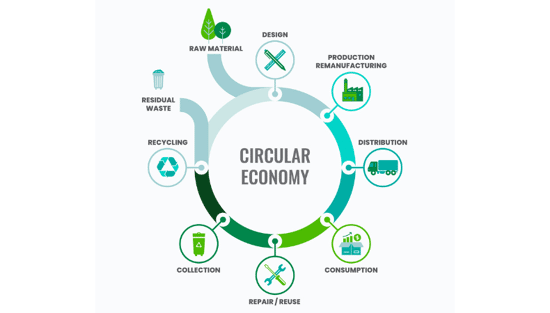
Sustainability Spotlight
Sustainability Spotlight offers informative and actionable advice around environmental best practice to allow businesses to make more sustainable and environmentally friendly choices for their business. FESPA speaks to industry experts about sustainability where you can discover business opportunities to reduce, reuse and recycle materials and improve your knowledge.
All articles
A revised look at sustainability in wide format print
Sustainability is crucial for wide-format print, moving beyond marketing to an imperative driven by brands and regulations. Common "eco" claims often mask complexities; true sustainability demands carbon reduction as a core principle. Life Cycle Assessment (LCA) offers data-driven insights for genuine environmental improvement, as demonstrated by UFABRIK's transparent approach.


Empowering the Print Community – Insights from Suzi Ward, MD of FESPA UK
In this podcast episode, Debbie McKeegan interviews Suzi Ward, the Managing Director of Fespa UK, discussing the evolution of the association, its role in supporting the print industry, and the importance of community engagement.
.png?width=550)
The European Union is driving massive sustainability change
The EU's ambitious Green Deal, aiming for climate neutrality by 2050, drives significant sustainability changes. Businesses worldwide, especially printers, must adapt to complex EU legislation. Compliance creates challenges but also new opportunities in areas like packaging and signage.

What are the benefits of print businesses committing to a Net Zero Carbon emissions target?
We speak to Robert Connell, Senior Commercial Sustainability Manager at ClimatePartner who who offer solutions along the net zero cycle to support business’s effort in corporate climate action. In this discussion we discuss the importance and the process and benefits of businesses committing to a Net Zero Carbon emissions target.

6 Sustainable Printing Practices Changing the Game in Textile and Apparel Decoration
The textile industry is shifting towards sustainability. Innovations like waterless and digital printing, eco-friendly inks, and recycled materials are reducing waste. AI and automation optimise production, while circular models promote reuse. Consumer demand for transparency drives this change, making sustainable practices essential for future-focused brands.

Sustainability in Production Print: Advancing Practices in Wide Format, Textiles, and Software
As sustainability continues to take centerstage across industries, the production print sector is making massive strides in integrating eco-conscious practices. From wide format to textile applications, with the growing reliance on advanced production software, the space is evolving to meet environmental goals as well as consumer demand for sustainable products.

Why must the print industry recognise software and material innovation
Laurel Brunner argues that the printing industry must recognise the value of both software and material innovation, and be willing to pay for it. Software, though intangible, drives efficiency and reduces carbon footprints. While materials science currently dominates, R&D costs are inherent in all advancements. Paying a premium ensures continued progress, benefiting the industry's evolution and sustainability.

Green Printing: how Sustainability drives business success
Nessan Cleary shares sustainable printing benefits businesses and the environment. Auditing suppliers and using eco-friendly materials are crucial. Optimising production with energy-efficient equipment and minimising waste reduces costs. Proper waste disposal and premises efficiency further lower the carbon footprint. Staff training and customer recycling solutions complete the sustainable approach.

Sustainability and keeping the faith
Laurel Brunner discusses how the printing industry has drastically reduced its environmental impact through technological advances, despite lingering perceptions of paper waste. While consumer habits pose a challenge, the industry continues to pursue greener practices.

Kyocera wins Anthem Award for Sustainability, Environment and Climate
Laurel Brunner shares how Kyocera, a Japanese manufacturer of digital printing system was awarded a silver award for its green skills report on "A Green Edge: Green Skills for the Future".

How to design for a circular economy in a linear world
Laurel Brunner explains the challenges for businesses to prioritise circular economy when economies have evolved to be linear. Laurel shares examples of different businesses who are designing products that can suppor the circular economy. These include The Ellen MacArthur Foundation, DS Smith and Vilsund Blue A/S.

Flex-Europa - a sustainable future for the digital printing industry
Rashed Abdeljalil, Business Development Manager at Flex-Europa discusses how the business is exploring innovativer ways to lower their ecological footprint and encourage their clients to do the same. The business uses eco-friendly inks, UV printing and recylcable substrates and uses digital label printers.

How is the textile industry committed to becoming more sustainable
Debbie McKeegan discusses how the textile industry has experienced various challenges and has successfully demonstrated resilience, innovation and an unwavering commitment to sustainability.

Ukranian printing company invests in Flexcel NX Wide
Ukrpol, a Ukranian printing house that focuses on commercial printing and packaging production has a wide array of customers that are in the food, cosmetics and medical sectors. The company recently bought a Miraclon Flexcel NX Wide 4260 flexographic platemaking system. This purchase will help the company attract customers who acknowledge the value of modern flexo for packaging production.

How to tackle polyester pollution with Matter Industries and Paradise Textiles
In this podcast Debbie McKeegan speaks to Adam Root, founder of Matter Industries and his innovation Regen™, a capture technology to remove microfibres from the textile manufacturing process for the benefit of human and environmental health. We also meet Lewis Shuler of Paradise Textiles who are collaborating on research and the application of Matter’s technology for textile manufacturing.

How reducing waste can lower costs and improve profitability for your business
Nessan Cleary explains how businesses can increase their profit by being more sustainable by reducing energy consumption, improving recycling and most importantly motivating staff to implement these new policies.

What questions should you ask new sustainability stakeholders?
Steve Lister discusses upcoming sustainability stakeholders for 2024 and discover vital questions to ask them. In a shifting landscape, proactive engagement is key. Learn how to align with new partners' goals and navigate evolving expectations, ensuring your organization stays at the forefront of environmental and social responsibility.

How to assess and report your environmental sustainability
Laurel Brunner discusses how ISO has now approved a new project that will suppor the industry's sustainability. The new work, ISO 19311, provides requirements for sustainability assessment reporting and the idea is to make it easier to evaluate sustainability reports, like for like.
